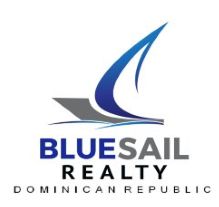Dominican Republic Real Estate Taxes : A Comprehensive Guide for Buyers and Investors
The Dominican Republic is becoming an increasingly popular destination for real estate investment, with its attractive properties, beautiful beaches, and favorable tax conditions. However, for any investor or individual looking to buy a property in the Dominican Republic, understanding the taxes involved is crucial. Whether you’re purchasing a condo, a beachfront villa, or a retirement home, it’s important to have a clear grasp of the local tax landscape. In this detailed guide, we will break down the various taxes associated with buying property in the Dominican Republic, including transfer taxes, annual property taxes, and other relevant costs.
We’ll also provide useful tips for navigating the tax system and explore how Blue Sail Realty can help you make an informed investment decision in the Dominican Republic real estate market.
Why Understanding Real Estate Taxes in the Dominican Republic Matters
As a foreign buyer, understanding the tax obligations associated with real estate in the Dominican Republic can save you from potential complications later on. Real estate taxes are relatively low compared to other Caribbean islands, but they are still an essential factor to consider in your overall investment plan. These taxes affect not just the purchase price but also the long-term costs of owning a property in the Dominican Republic.
From property transfer taxes and annual real estate taxes to maintenance fees, understanding your tax obligations will ensure that your investment is financially viable.
Real Estate Taxes in the Dominican Republic: The Breakdown
1. Property Transfer Tax (ITBIS)
One of the first taxes you’ll encounter when buying real estate in the Dominican Republic is the Property Transfer Tax or Impuesto de Transferencia de Bienes Inmuebles (ITBIS). This tax is levied on the sale of real property and is typically paid by the buyer at the time of the sale. The ITBIS tax is 3% of the purchase price or the appraised value of the property, whichever is higher.
Example: If you purchase a property for $200,000, the transfer tax will be $6,000 (3% of $200,000).
It’s important to note that the transfer tax is paid upfront and is calculated based on the higher of either the declared purchase price or the official appraisal value from the government.
2. Registration Fees ( included in your legal fees)
After paying the property transfer tax, the next step in purchasing real estate in the Dominican Republic is registering your property. The registration fees are a one-time cost that is paid to the Registro de Títulos (Title Registry). These fees generally range from 1% to 2% of the property’s purchase price.
Registration is a crucial part of the buying process as it ensures that your property rights are legally recognized by the Dominican government. Without this step, you cannot prove ownership of your property.
3. Annual Property Taxes
Once the property is registered in your name, you’ll be subject to annual property taxes. The Dominican Republic imposes a property tax (Impuesto sobre la Propiedad Inmobiliaria), which is typically calculated at a rate of 1% of the property’s assessed value above a certain threshold.
- For properties with an appraised value of up to RD$8,000,000 (approximately USD$140,000), there is no annual property tax due.
- For properties valued above this threshold, you will pay 1% on the appraised value in excess of RD$8,000,000.
Example: If you own a property valued at RD$10,000,000 (approximately USD$175,000), the taxable value would be RD$2,000,000 (the portion over RD$8,000,000), and you would pay 1% of that amount, which is RD$20,000 (approximately USD$350) annually.
4. Property Maintenance Fees and HOA (Homeowners Association) Fees
In addition to taxes, many properties in the Dominican Republic—especially in gated communities or condominium complexes—come with monthly maintenance fees or Homeowners Association (HOA) fees. These fees are used for the upkeep of common areas, such as pools, gardens, security services, and other amenities.
The amount of HOA fees can vary depending on the property’s location, size, and the amenities it offers. Typically, these fees range from $100 to $500 per month for standard condos, but they can go higher for more luxurious properties.
Navigating Dominican Real Estate Taxes: Tips and Best Practices
- Consult with Local Professionals It’s essential to work with a local real estate attorney and tax advisor when purchasing property in the Dominican Republic. They can help ensure that you comply with all the legal and tax requirements, making the process smoother and more efficient.
- Stay Updated on Tax Laws Tax laws can change, and it’s essential to stay updated on the latest regulations, especially if you’re buying property as an investment or plan to rent it out. Working with a local professional will help you navigate these changes effectively.
- Know the Exemptions There are several exemptions and reductions available under Dominican law, particularly when it comes to capital gains tax and property taxes. If you’ve owned a property for more than 10 years or if it’s your primary residence, you may qualify for some exemptions or reductions in taxes.
- Budget for Maintenance Fees If you’re purchasing a property in a gated community or condominium complex, be sure to factor in the cost of monthly maintenance or HOA fees. These can vary depending on the amenities offered, and it’s important to know these costs upfront.
How Blue Sail Realty Can Help
At Blue Sail Realty, we understand the complexities of the Dominican real estate market, including the tax landscape. Our experienced team can guide you through the entire process, from finding the perfect property to understanding your tax obligations. We have a network of trusted legal and tax professionals who can help ensure that your investment is both legally sound and financially viable.
Whether you’re buying a home for personal use or looking for an investment property, Blue Sail Realty is here to make your Dominican real estate experience as smooth and profitable as possible.
Conclusion
The Dominican Republic offers incredible opportunities for real estate buyers, but it’s essential to understand the taxes and fees involved in the process. With relatively low taxes compared to other Caribbean islands, owning property in the Dominican Republic can be a smart financial move. By being informed about transfer taxes, property taxes, and other associated costs, you can make a more confident and secure investment.
At Blue Sail Realty, we are committed to helping you navigate the Dominican real estate market with ease. Contact us today to learn more about property options, tax implications, and how we can assist you with every step of the buying process.
Click below to see more information on Oceanfront villas in Cabarete








